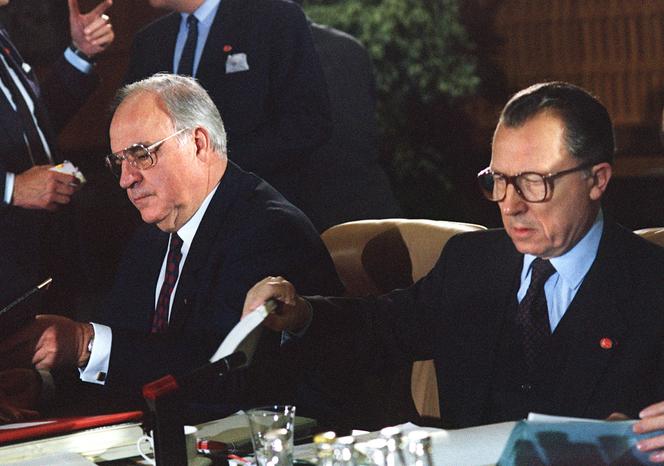


Twinning, youth exchanges and the growing density of economic and political relations do little or nothing to help. For Germans, the French are an enigma, and vice versa, so different are their codes. This is also true, anecdotally, of everyday encounters. At the level of decision-makers, between senior civil servants, ministers and other state dignitaries, the spontaneous lack of understanding between representatives of both sides entails risks of another dimension: The relationship quickly turns into an engine that doesn't run smoothly, to its own detriment and that of others.
What would have happened after the fall of the Berlin Wall if Jacques Delors had not been in the pivotal position of president of the European Commission? France's support for German unification was by no means a foregone conclusion. A historic mistrust hovered over the relationship between the two founding members of the European Community.
Five years earlier, at Verdun, Francois Mitterrand had "suddenly felt the need to come out of [his] solitude and make a gesture towards Helmut Kohl." The Douaumont ceremony [in the Meuse] had been a pivotal moment in Franco-German relations: The memory of the First World War had visibly begun to enter the shared memory of both countries and Europe.
In the autumn of 1989, the end of the Cold War had suddenly awakened memories and anxieties that were far more acute among the French elite. Mitterrand was reluctant to support the process that would lead to German reunification. His state visit to East Germany at the end of December, decided four days after the fall of the Wall, was the most telling illustration of this. Delors, on the other hand, had begun to send out unambiguously positive signals as early as October 17, 1989, in a speech to the College of Europe, in Bruges.
The French president of the European Commission proved unwaveringly supportive throughout the reunification process, starting with his public pronouncements three days after the fall of the Wall. "Ich habe keine Angst" ("I'm not afraid"), he said at the time in front of German and French prime-time television cameras in Berlin.
Hans-Dietrich Genscher, foreign minister and vice-chancellor in 1989, later recounted receiving a phone call from Delors even before the fall of the Wall: "Hans-Dietrich, what can we expect? A new member of the European Community?" Genscher is said to have hinted at reunification, and Delors simply took note: "I've understood." Numerous testimonials from German civil servants have attested to the constructive creativity employed by the Commission to explore the uncharted legal terrain that was the integration of East Germany.
You have 55% of this article left to read. The rest is for subscribers only.
